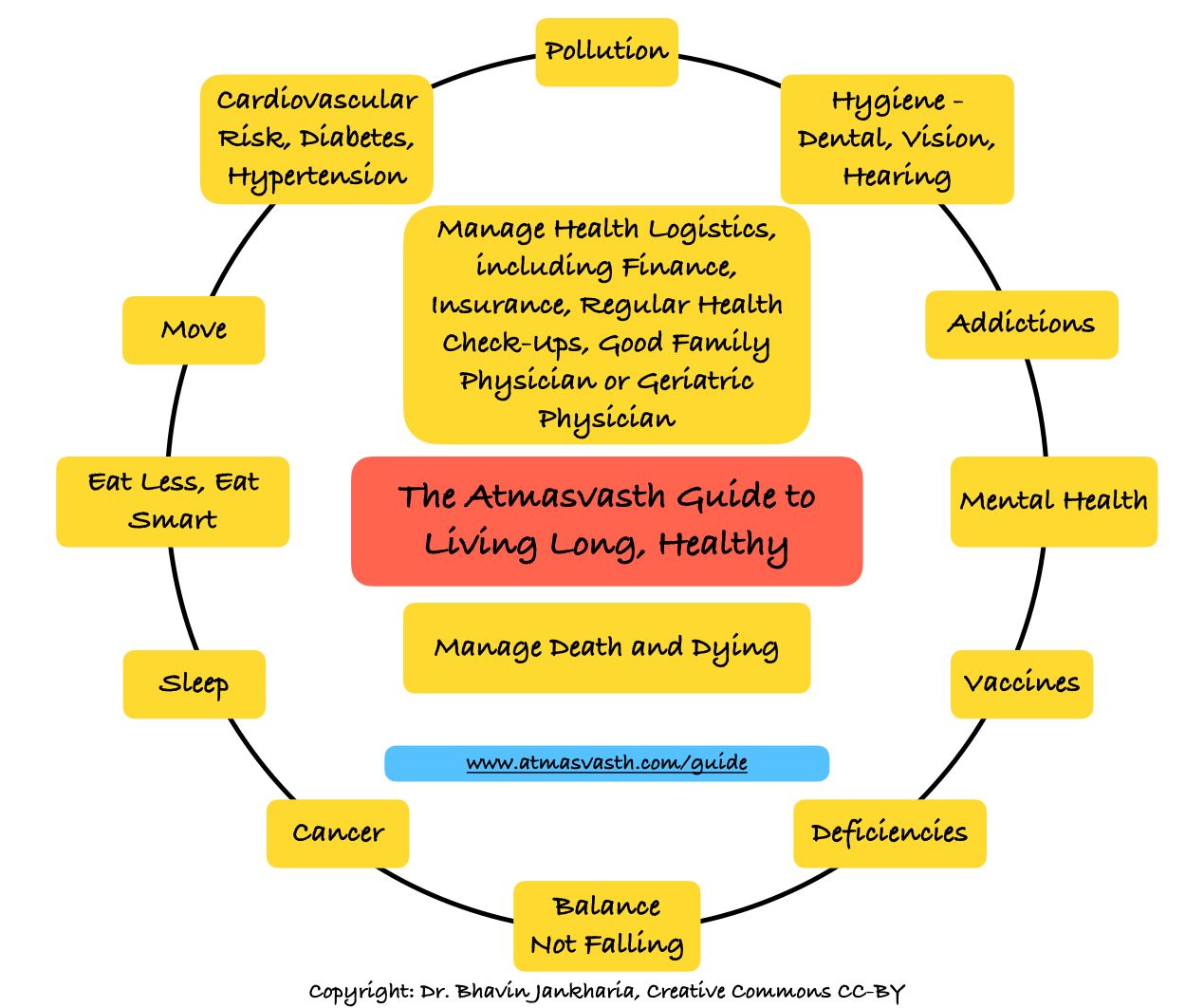The Healthspan of the Mind: Preventing Cognitive Decline
It is possible to prevent cognitive decline using a combination of physical activity, good sleep, other healthy habits, improving cognitive reserve with lifelong learning and being socially connected.

The Book - Kindle Version Now Available Worldwide

The Detailed 15-Point Guide to Live Long, Healthy

Audio
Text
In the 15-point guide to live long, healthy, which forms the core of my book, the 4th point is this.
4. Calm your mind and build cognitive reserves - daily (meditation, downtime, learning, reading).
+ Meditate for 10-30 minutes - a stable mind helps in the long run.
+ Read - preferably a book, else a long article, daily.
+ Set limits to the time spent on social media including WhatsApp - not more than a total of 1-2 hours per day, not more than 30 minutes per session, etc. Don’t get into arguments or debates with people online. Aim for digital minimalism.
+ Learn a new skill - language, musical instrument, singing, dancing, gardening, etc.
Over the last 3 1/2 years, I have addressed the issue of cognition loss in multiple different articles, but it is only in the book that I brought all these points together in a new article, addressing the issue in more detail.
Here is an abridged version.
Cognitive decline is the reduction in one or more cognitive abilities, such as memory, awareness, judgement and mental acuity. When the decline crosses a specific threshold and compromises social or occupational functioning, it becomes dementia.
Dementia or cognitive decline is a major issue. It not only affects your ability to carry out your day-to-day tasks effectively, but can often accelerate other diseases, increase the risk of frailty and falls and reduce lifespan. Apart from what it does to you, there is a high burden imposed on those around you and your caregivers.
There are four issues.
• Can we prevent cognitive decline?
• Can we arrest cognitive decline or reduce its rate of decline, once it occurs?
• What is the impact of social isolation and loneliness?
• Should we test for cognitive decline?
Can We Prevent Cognitive Decline?
The same factors that increase healthspan and lifespan also prevent or delay cognitive decline. The CHAP study [1], which I discussed in my piece published on 09 May 2022, evaluated people over the age of 65, from a geographically defined community in Chicago. 10,802 people were enrolled between 1993 and 2012, and 2,449 were eligible for this assessment.
The study looked at 5 factors.
· Adherence to a Mediterranean-DASH (Dietary Approaches to Stop Hypertension) / MIND Diet Intervention for Neurodegenerative Delay (MIND) diet
· Late-life cognitive activities like reading, playing cards, solving puzzles, etc.
· Physical activity (PA) - healthy PA was defined as greater than 150 minutes of moderate PA per week.
· Non-smokers, both reformed and never-smokers.
· No or light to moderate alcohol consumption (1-15 g/day in women and 1-30 g/day in men).
The results were astounding.
Women over 65 who met 4 or 5 of these health criteria had a life expectancy of 24.2 years (22.8 to 25.5) and lived 3.1 years longer than those with 1 or none of these factors (life expectancy - 21.1 years - 19.5 to 22.4). More importantly, the women with healthy habits (4/5 or 5/5) remained Alzheimer’s free for 89.2% of that life expectancy (21.6 years lived without dementia of those 24.2 years), while the women with an unhealthy lifestyle (0/5 or 1/5) were dementia free for only 80.7% of their remaining years (i.e. 17 years out of their life expectancy of 21.1 years).
It was the same for men. Men with a healthy lifestyle (4/5 or 5/5) lived 23.1 years beyond 65 (21.4 to 24.6), while the unhealthy men (0/5 or 1/5) had a life expectancy of only 17.4 years (15.8 to 20.1). The healthy men lived 94.9% of their remaining lifespan over 65, dementia free (21.7 years without dementia), compared to the unhealthy men who lived only 88% of their lives, dementia free (15.3 years).
So effectively, women with a healthy lifestyle lived 3.1 years longer than women with an unhealthy lifestyle. With men, the difference was even more at 5.7 years. The same was true for the number of dementia-free years.
This means that the healthier you are, the better your chances are of preventing cognitive decline and dementia.
The combination of sleep and PA also matters. A study by Mikaela Bloomberg [2] showed that those with poor sleep (less than 6 hours or greater than 8 hours) had more rapid cognitive decline than those who had optimal sleep (6-8 hours). This study used data from the English Longitudinal Study of Ageing, which I covered in my piece on 16 Jul 2023. High physical activity (PA) levels were protective at baseline, but over 10 years, poor sleep was a more important factor than PA for cognitive decline. This is important to note, even though PA improves lifespan and other parameters of your healthspan.
Can we arrest cognitive decline or reduce its rate of decline, once it occurs?
Cognitive reserve is the resilience some people develop to resist the effects of dementia, even if their brains show the same degeneration as those with functional dementia on autopsy or functional MRI. Those with higher cognitive reserve somehow develop alternate functional pathways in the damaged brain areas. The main factor that influences the extent of cognitive reserve is education. “Individuals with increased cognitive reserve tend to be more highly educated, possess higher IQs, reach higher occupational attainment, and are involved in a diverse range of leisurely activities.” [3].
Not only that, as the NUN study [4], which I wrote about on 03 Apr 2022, showed, cognitive decline is reversible and in many instances may never progress to dementia. The higher the levels of education, the higher the reversibility and lower the risk of dementia.
Life-long learning also increases cognitive reserve and staves off cognitive decline, as the Rush University study [1] showed. The study showed that those who maintain higher levels of cognitive activity can push back dementia by almost 5 years compared to those with lower levels. These “cognitive” activities include reading, writing, and playing games such as puzzles, cards, etc.
It is a good idea to start structured learning and cultivate a wide range of leisure activities and hobbies that involve reading and learning, regardless of your education level, and then implement that knowledge effectively.
What about Loneliness and Social Isolation?
Loneliness and social isolation accelerate cognitive decline. I addressed this in a detailed article published on 22 Mar 2022.
As Baz Luhrman says in his song “Everybody is Free to Wear Sunscreen”.
Get to know your parents, you never know when they’ll be gone for good
Be nice to your siblings, they’re your best link to your past
And the people most likely to stick with you in the future
Understand that friends come and go
But with a precious few, you should hold on
Work hard to bridge the gaps in geography and lifestyle
For as the older you get
The more you need the people you knew when you were young
Cultivating relationships with a spouse, friends, and family makes a difference. It allows us to connect, share thoughts and feelings, and spend time with them, with the confidence and understanding that they also have our backs as we have theirs. The poets, writers, and philosophers have been right for over two millennia…we now have objective data too. Loneliness leads to early dementia.
Should We Test for Cognitive Decline?
Should we test for minimal cognitive impairment (MCI), so that we can perhaps intensify our efforts to reduce or control the decline if we test positive? If you have no symptoms, or if you just tend to forget names and car keys but are otherwise fine, it probably does not help to get tested, especially now that we know that MCI can spontaneously reverse.
However, if others around you notice you are finding it difficult to carry out daily activities, then testing and evaluation by a professional may help you and your family and care-givers to understand the extent of cognitive decline and to institute measures to prevent harm to yourself and those around you.
What does this mean for you and I in our atmasvasth quest to live long, healthy?
· It is possible to prevent or push back cognitive decline and dementia with sensible eating, physical activity, adequate sleep (6-8 hours), not smoking, none to minimal alcohol consumption and engaging in cognitive activities.
· The higher the cognitive reserve, which is typically linked to the level of education, the better the chance that minimal cognitive decline may be reversible and/or that dementia may be delayed or prevented.
· The more you cultivate habits that allow learning and intellectual stimulation, the more likely you are to be dementia free.
· As you get older, it is more important to maintain relationships with your near and dear ones to reduce the chance of dementia.

In the next piece, I will discuss new data and updates from the last year related to preventing or reducing cognitive loss and dementia.
Footnotes
1. Dhana K et al. BMJ. 2022 Apr 13;377:e068390.
2. Bloomberg M et al. Lancet Healthy Longev. 2023 Jul;4(7):e345-e353.
3. Pengpid S et al. Geriatric Psychiatry 2021;36:1722
4. Iraniparast M et al. Neurology. 2022 Mar 15;98(11):e1114-e1123.
Atmasvasth Newsletter
Join the newsletter to receive the latest updates in your inbox.



